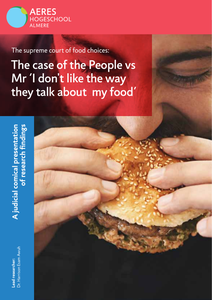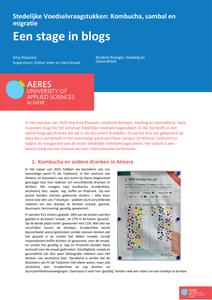We willen naar een meer plantaardig en minder dierlijk voedingspatroon, vanwege duurzaamheid en gezondheid. Marketeers zijn er daarom druk mee: Vegan is de nieuwe trend. Het aantal vleesvervangers en zuivelvervangers in de supermarkt neemt snel toe. Maar is plantaardige voeding nu ook meteen gezond?
DOCUMENT

Rationale: The goal of the PROVE (Protein enriched vegan products to fight malnutrition) project is to innovate the assortment of plant-based energy and protein enriched products for dietary treatment of (risk of) malnutrition. We aimed to explore preferences of dietitians for plant-based products in the treatment of malnutrition.Methods: In this design-based research project, the Double Diamond model was applied. Contextual interviews were performed with 9 dietitians experienced in treating clients using a vegan diet (1 omnivore, 3 flexi-vegetarian, 1 vegetarian, 1 pescetarian, 3 flexi-vegan). Interviews focused on preferences regarding product type, size, nutrients, taste, packaging, price. Affinity mapping was used to code and analyze the transcripted interviews. The results were summarized into concept products.Results: Four product concepts were developed that represent preferences of dietitians for a plant-based energy and protein enriched product for clients with (risk of) malnutrition. Overall, pea or soy were preferred as a protein source and addition of vitamins and minerals was not preferred.Conclusion: Preferences of dietitians for plant-based protein and energy rich products for patients with risk of malnutrition largely vary. Within PROVE, we will enrich these results with patient perspectives, as basis to develop and deliver plant-based energy and protein enriched products for treatment of (risk of) malnutrition.
DOCUMENT
Whether going fully vegan or embracing a more ‘flexitarian’ lifestyle, consumers are switching to plantbased food options in ever-increasing numbers. With 9 billion people to feed in the world in 2050, there are many reasons why: from perceived benefits for people’s own health and wellbeing, to concerns about animal welfare and the environmental impact of meat farming, or just the desire to be ‘on trend’.Interview with Fred van de Velde, professor and researcher at HAS University of Applied Science.
LINK
De opmars van zuivelvervangers is onmiskenbaar. En de groei versnelt, zo valt op te maken uit marktonderzoek. Hoe gaan zuivelverwerkers om met de transitie van dierlijk naar plantaardig eiwit? En wat is het perspectief voor de melkveehouder?
DOCUMENT

This booklet outlines a 'court case' about shaming someone's food choices. Dit boekwerk behandelt een 'rechtszaak' over het te schande maken van iemands voedselkeuzes.
DOCUMENT

In het voorjaar van 2023 liep Amy Klaassen, studente Biologie, Voeding en Gezondheid, twee maanden stage bij het lectoraat Stedelijke Voedselvraagstukken. In die tijd heeft ze een aantal blogs geschreven die we in dit document bundelen. De eerste drie zijn gebaseerd op data die is verzameld in het voormalige pand van Flevo Campus (in Almere Centrum) en tijdens de inauguratie van de lector Stedelijke Voedselvraagstukken. Het laatste is een beschrijving van een bezoek aan een internationale conferentie.
DOCUMENT

Anthropocentrism is the belief that value is focused on human beings and that all other beings are means to human ends. Related to anthropocentrism, humanism privileges the aim of improvement of human welfare. Humanism has underwritten efforts to expose social injustices and improve the welfare of all human beings. In relation to the environment, post-humanism can be defined by a number of characteristics. First, post-humanism exposes anthropocentrism as an attempt to ignore the behavior in which humans focus on themselves at the expanse of all other species. Second, post-humanism critiques exclusive moral focus on human inequalities in relation to environmental protection, emphasizing that inequality between species should remain within the scope of ethical consideration. Third, post-humanism exposes anthropocentrism as an inadequate basis for environmental action as it criticizes anthropocentrism as ethically wrong as well as pragmatically ineffective. https://onlinelibrary.wiley.com/doi/book/10.1002/9781118924396 LinkedIn: https://www.linkedin.com/in/helenkopnina/
MULTIFILE

Trends in eiwittransitie kunnen regionaal verschillen. In groeiende economieën verschuiven diëten wereldwijd van plantaardige naar dierlijke eiwitten. In veel economisch ontwikkelde regio's gebeurt echter het tegenovergestelde vanwege de zorg voor milieu en gezondheid. Wij onderzochten de relatie tussen vijf drijvende krachten en eiwittransitietrends zoals deze worden ervaren door jongvolwassenen in ontwikkelde regio's in China (Shanghai) en Nederland (Amsterdam, lees: de Randstad). De onderzochte drijvende krachten waren: milieubewustzijn; het beleid; cultuur; geld; en gezondheid. De gegevens zijn verkregen door 200 vragenlijsten te laten beantwoorden in beide regio's. De resultaten geven aan dat jongvolwassenen in Shanghai meer dierlijke eiwitten consumeren dan plantaardige eiwitten, maar dat er een verandering naar plantaardige eiwitten is ingezet, terwijl de trend van jongvolwassenen in Amsterdam om plantaardig eiwit te consumeren al verder ontwikkeld is. De rangschikking van de drijvende krachten in Shanghai was Geld> Milieubewustzijn> Gezondheid> Cultuur> Beleid, en in Amsterdam Gezondheid> Milieubewustzijn> Geld> Beleid> Cultuur. Eiwitkeuzes in de voeding van jongvolwassenen worden dus in Shanghai door andere drijvende krachten bepaald dan in Amsterdam
MULTIFILE
